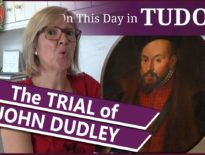On this day in Tudor history, 16th August 1599, soldier and Lord President of Munster in Ireland, Sir Thomas Norris, died at his home, Mallow Castle, in Cork, as a result of an injury he’d sustained in a skirmish with Irish troops on 30th May 1599. His brother, Henry, died just five days later. Thomas's brothers, John, William and Maximilian, who were also soldiers, died in 1597, 1579 and 1593 respectively.
Queen Elizabeth I recognised the sacrifice of this family and wrote a letter of condolence to her friends, Henry Norris, 1st Baron Norris, and his wife, Margery Williams. Find out what she wrote to the grieving couple in today's talk.
Also on this day in Tudor history, 16th August 1513, the Battle of Spurs took place at Guinegate, or Enguinegatte, in France. It actually wasn't a pitched battle at all, as the French knights fled the scene, but that didn't stop Henry VIII claiming victory and doing a bit of exaggerating. Find out more about it in last year’s video:
Also on this day in history:
- 1533 (16th or 17th August) – Death of Thomas Skevington, Abbot of Beaulieu and Bishop of Bangor, at Beaulieu. His body was buried at Beaulieu and his heart buried on the north wall of Bangor Cathedral, before the picture of St Deiniol.
- 1549 – Death of Sir Christopher More, landowner and administrator. He was buried in St Nicholas's Church, Guildford, in the Loseley Chapel. More was a JP and Sheriff during the reign of Henry VIII and was appointed, in 1539, to the guard of honour prepared for Anne of Cleves in late 1539.
Transcript:
On this day in Tudor history, 16th August 1599, soldier and Lord President of Munster in Ireland, Sir Thomas Norris, died at his home, Mallow Castle, in Cork, as a result of an injury he’d sustained in a skirmish with Irish troops on 30th May 1599.
His brother, Sir Henry Norris, died just five days, on 21st August 1599, following complications from his leg being amputated after he was also injured in a skirmish with Irish troops in June 1599.
These two men were the sons of Henry Norris, 1st Baron Norris, and his wife, Margery Williams, and the grandsons of the Henry Norris who was groom of the stool to Henry VIII and who was executed in May 1536 in the fall of Anne Boleyn. Thomas and Henry were not the only sons that Baron Norris and his wife lost in service to the crown, they had lost their eldest son, Sir John Norris, while he served as Lord President of Munster, in September 1597; their son, William, in 1579, also in Ireland, and another son, Maximilian, who died campaigning in Brittany in 1593. Five sons lost serving as soldiers for Elizabeth I.
The Norrises had a long-standing connection with Queen Elizabeth I. Baron Norris had been appointed by Mary I to guard Elizabeth during her house arrest at Woodstock in 1554 and Elizabeth became close to the baron and his wife. After she became queen, she made several visits to their home at Rycote in Oxfordshire, and she affectionately called Margery her “own dear crow”. Elizabeth also rewarded Norris with a number of titles and offices, including a knighthood and a barony, and also making him Lord Lieutenant of Oxfordshire.
After the Norris lost their son, John, in 1597, Elizabeth had written them a letter of condolence, and she did the same in 1599 following the deaths of Thomas and Henry. The letter still survives in the Bodleian Library Collection. Here is what she wrote:
“Your most Lovinge and Afectionate Soveraigne.
Elizabeth R.
Right Trustie and right welbeloved, And right deare and welbeloved we greet you well.The bitter accidentes befallen you which is the Cause of our writinge, beinge that which toucheth you bothe with equall smarte, And our desire that all the Comforte which we wishe to you, may reatch to each of you together with our lettres. Lothe we were to have written att all, because in such accidentes (for the most parte) the offeringe of Comforte, is but the presentinge of freshe occasion of sorrowe. But yet beinge well perswaded of your Constant resolution, grownded as well on the experience of other like mishapes (which yours have seene) as also Cheefely upon your religious obedience to the worke of his hande whose strokes ar avoidable we could not forbeare to doe our parte. Partely because we conceave that we shall therin propose our selves for an example to you, our losse in polliticke respecte (Consideringe their great merritt) beinge no lesse then yours in naturall Consideration. And partly by givinge you assuraunce that whatsoever from us may minister Comforte by demonstratinge towardes you the valeue we made of The departed, shall not faile to be ymployed to your best Contentmentes. Assuringe you that for this harde happ of yours we will give order that assone as possible he may leave his Charge in good sorte, he shalbe with you to yeald you all duety and service he may because we knowe it wold be some stay to your sorrowes, to have hym in your ey who nowe is in forraine partes and that your hard hap shall rather serve us for matter to increase our care of you then any waye to abate it. geven under our Signett att our Honor of Hampton Corte the 6th of September 1599 in the 41th yeare of our Raigne.”
When Elizabeth is talking about giving orders that “he may leave his charge” and saying that having him in heir eye will “be some stay to your sorrows”, she is talking about the Norris’s last surviving son, Sir Edward Norris, who, like his brothers, was a distinguished soldier, and who’d been appointed Governor of Ostend in 1590. He died a natural death in October 1603.
Link to see Elizabeth's letter - http://rycote.bodleian.ox.ac.uk/letter-of-condolence-from-elizabeth-to-henry-norris



Leave a Reply